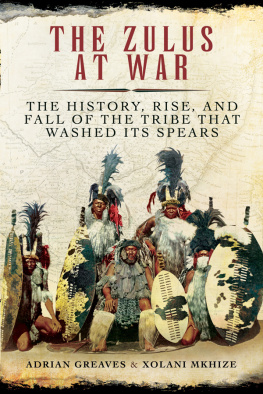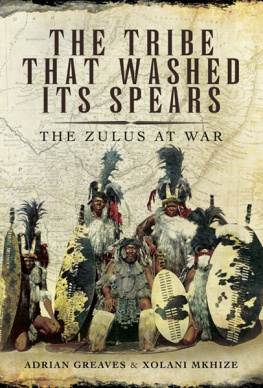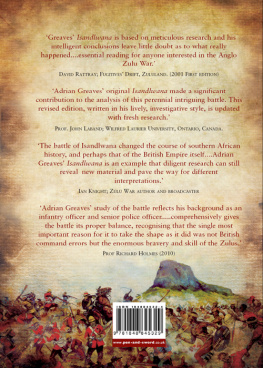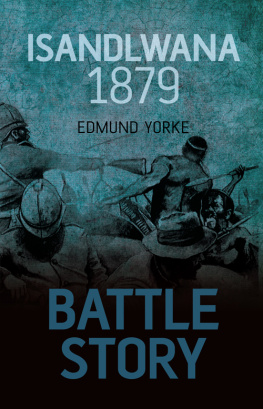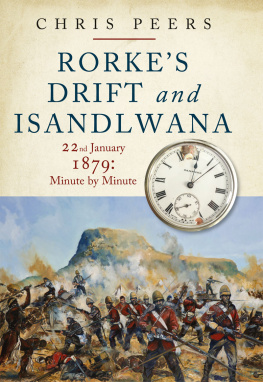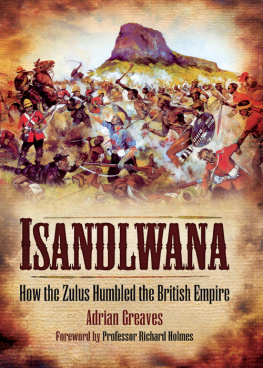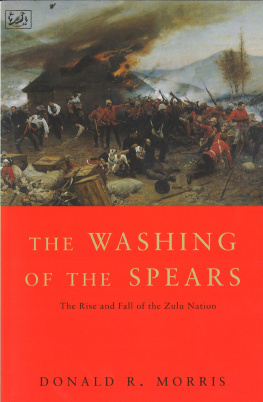First published in Great Britain in 2001 by
LEO COOPER
an imprint of
Pen & Sword Books Ltd
47 Church Street
Barnsley
South Yorkshire
S70 2AS
Copyright Brian Best and Adrian Greaves, 2001
9781783036219
A catalogue record for this book
is available from the British Library
Typset in 11/13pt Sabon by
Phoenix Typesetting, Ilkley, West Yorkshire
Printed in the United Kingdom by
CPI UK
Introduction
As the Editor for the Anglo Zulu War Historical Society Journal, I have been truly privileged to have access to the letters of Lieutenant Henry Curling of the Royal Artillery, relating to his experiences in the Anglo Zulu War of 1879.
As is increasingly well known, the British invasion of Zululand began disastrously with the British invaders being met and defeated by the Zulu Army at the battle of Isandlwana.
What is not so well known is that more British officers died in this battle than were lost at the Battle of Waterloo. Of the five who survived, only Lieutenant Curling was at the centre of the front line that experienced the full force of the main Zulu attack. Curling fought his way out through overwhelming numbers of massed Zulu warriors and, miraculously, survived to tell the tale.
At the following Court of Enquiry, his evidence was dismissed as irrelevant, probably because it was too embarrassing to the British military authorities. Curling said little more on the subjecthe was after all, a mere Lieutenant. The British commander, Lord Chelmsford, supported by numerous staff officers, had lost over fifteen hundred men and a major battle and, in so doing, humiliated Great Britain. Fortunately Henry Curling consoled himself in his favourite pastime, namely that of writing letters home. In these he paints the most vivid picture of the horror of the Zulu War and, in particular, his account of escaping slaughter at the hands of the Zulus makes for astonishing reading. His letters also allude to the fate of the two Royal Artillery guns that were lost at Isandlwana but, without further details, the exact sequence of events and their final resting place remains unknown even today.
Curling went on to see service in Afghanistan and steadily worked his way up through his Regiment to become a Lieutenant Colonel in Egypt. He then returned to the family home at Ramsgate where he enjoyed his retirement and, as a Justice of the Peace, regularly sat on the bench of Ramsgate Magistrates Court. He never married and it seems that his exploits were unknown beyond his immediate family. He died on 1 January 1910.
Having studied the battlefields of Zululand over many years and written extensively on the subject, I have always been intrigued by this Victorian gentleman who survived the front line at Isandlwana. On a visit to South Africa in March 2000 I had the opportunity of seeing and holding Lieutenant Curlings South African Campaign medal which he proudly wore on a daily basis throughout his remaining military service. On learning that this medal was going to auction, I was able to persuade the owner to allow me to purchase it and so return it to the United Kingdom. Before leaving South Africa, I was honoured to have a meeting with His Excellency Prince Buthelezi, a direct descendant of King Cetshwayo who ruled Zululand at the time of the Zulu War. Prince Buthelezi requested to see Curlings medal before it left Zululand and commented what enormous pleasure it gave him to hold it. I explained to His Excellency that my principal purpose in purchasing the medal was to make it available to members of the Anglo Zulu War Historical Society and the general public at exhibitions.
Within a week of returning to England I received a parcel through the post. The wrapping had disintegrated and it had been resealed by the postal authorities. On emptying the package I discovered that the envelope contained three bundles of original letters written by Lieutenant Curling to his family, including all those written during the Zulu War. Until then I had no idea these still existed. The coincidence of having obtained Curlings medal and received his letters within a matter of days was uncanny. I knew then that I just had to bring them to a much wider audience. Special thanks must go to Wing Commander Jack Curran, a descendant of Henry Curling, and to Tony Lucking for guiding the letters in my direction
A tremendous amount of hard work then followed deciphering and typing the three volumes as well as adding further material explaining the background against which Curling was writing. Brian Best of the Anglo Zulu War Historical Society carefully and diligently carried out this work and I am beholden to him for his dedicated endeavours.
Foreword
The recent discovery of the Curling letters has given Zulu War historians a fresh insight into a number of aspects of the Zulu War of 1879. Lieutenant Curling, a young Royal Artillery officer, took part in the famous battle of Isandlwana that resulted in a great victory to the Zulus. The British invasion force was virtually annihilated and only a handful of survivors escaped to tell the tale. Curling was one of those survivorsand he was unique because he was also the sole survivor from the British front line that bore the brunt of the ferocious Zulu attack. He witnessed the whole battle and destruction of the British camp and its defenders before escaping on horseback. Curling was very much the family man and a prolific letter writer. His detailed accounts of life in the Victorian British Army make fascinating reading but it is his accounts of the Zululand invasion and Isandlwana that are so gripping.
Curling was a sensitive human being who was deeply affected by what he witnessed at Isandlwana. The publication of this collection of letters constitutes an important contribution to the saga of one of the greatest dramas in British military history, and we have a great debt to Adrian Greaves for his efforts in making these invaluable documents accessible to us.
David Rattray
Fugitives Drift Lodge
KwaZulu Natal
South Africa
[Reproduction from faded original.]
The Battle of Isandlwana (copyright of Dr. Adrian Greaves)
Principal towns, roads and routes together with main actions1879.
Chapter One
Early Years
On 27 July 1847, Henry and Mary Curling became proud parents of their first-born child, a boy they named Henry Thomas. They had recently moved into a new house in the smart cliff-top area of Ramsgate called St Lawrence. The house was called Augusta Lodge, which was later changed to Chylton Lodge, named after the nearby village of Chilton from where the Curling family originated. It was part of an attractive development designed and built by Edward Pugin, the son of the celebrated architect, August Pugin.


